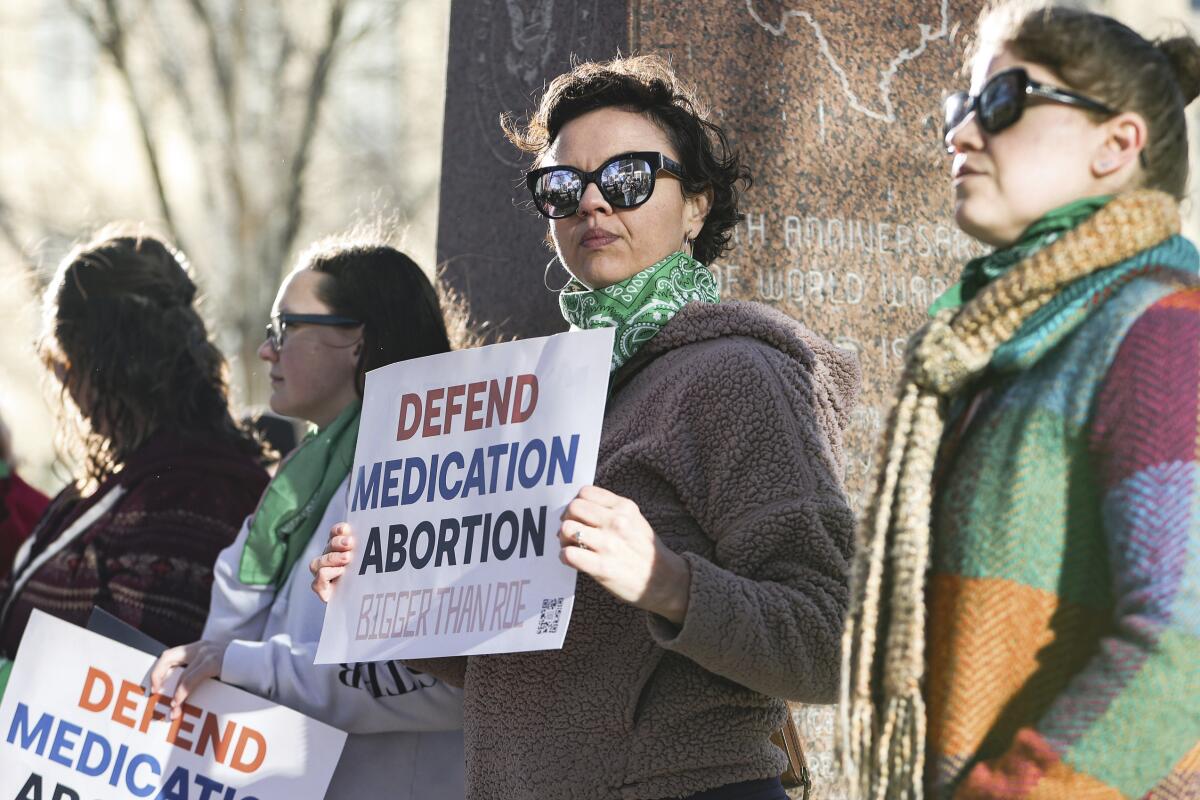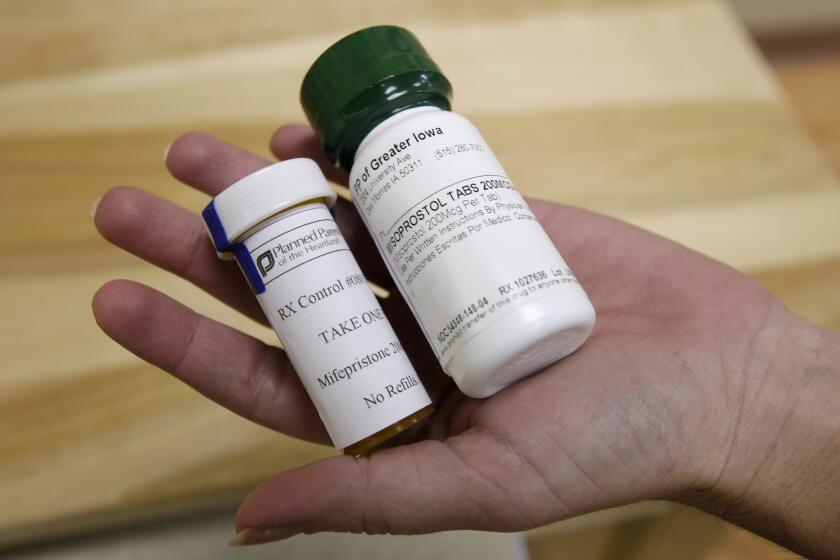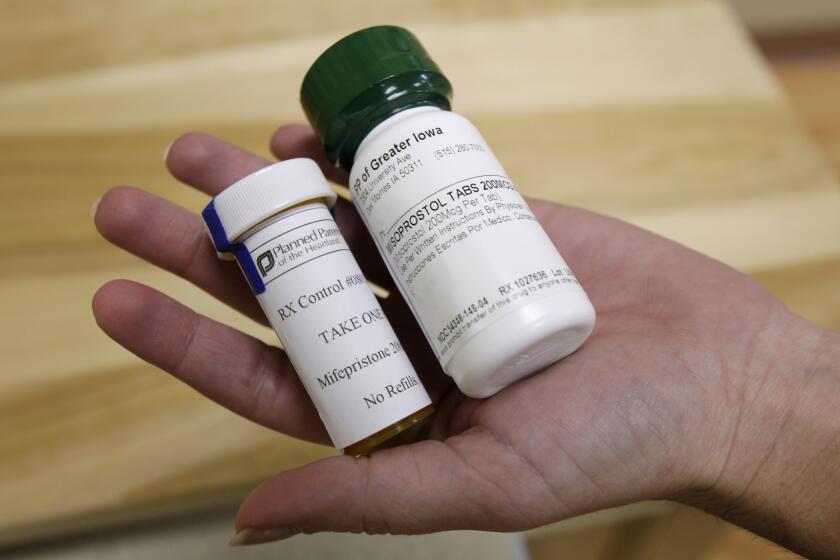Editorial: A federal judge outlaws an abortion pill thatâs safer than Tylenol. This is ridiculous

In the most far-reaching court ruling on abortion since the Supreme Court overturned Roe vs. Wade and robbed women of the constitutional right to an abortion last year, a federal judge in Texas has suspended the Food and Drug Administrationâs approval of mifepristone, the first of a two-drug regimen taken as part of a medication abortion.
U.S. District Court Judge Matthew J. Kacsmaryk on Friday ordered the preliminary injunction on mifepristone in a ruling on a lawsuit filed by an alliance of antiabortion groups and doctors claiming the FDA did not adequately study the drug before it was approved in 2000 and that using the medication is dangerous. The second drug, misoprostol, has other uses including preventing stomach ulcers and is less regulated. It can be used alone to terminate a pregnancy, though it is slightly less effective.
Fortunately, the ruling does not go into effect for seven days so that the federal government may file an appeal, which U.S. Atty. Gen. Merrick Garland said it will do. Adding to the uncertainty is a preliminary injunction on Friday by U.S. District Judge Thomas O. Rice in Spokane, Wash., barring the FDA from removing mifepristone from the market in 17 states and the District of Columbia, in response to a lawsuit arguing that the special rules that the FDA has put on mifepristone are too restrictive and should be removed. Itâs not clear which injunction will prevail.
No matter the outcome, the Texas ruling is a travesty that seeks to outlaw overwhelmingly safe medication abortion across the entire country, including in states that vigorously protect abortion such as California, Oregon and New York.
Abortion opponents have resurrected the Comstock Act to falsely claim that medication abortion pills canât be mailed out.
If the judgeâs ruling goes into effect, it will create chaos across a post-Roe nation that is already a patchwork of states that allow abortion, ban abortion and have varying restrictions in between. Medication abortion is the most common form of abortion in the first trimester of gestation and a ban on mifepristone will leave clinics across the country scrambling to decide whether to use just the second drug, misoprostol, for abortions.
Reproductive rights advocates and doctors decried this decision that ignores two decades of safe usage and oversight by the FDA. âThis medicine has gone through the toughest safety reviews and has been used safely and effectively for over 20 years,â said Daniel Grossman, a faculty member in the Department of Obstetrics, Gynecology and Reproductive Sciences at UC San Francisco and director of a reproductive health research program there. âWe need expanded access to abortion care, not court rulings based in junk science.â According to that research program, medication abortion is safer than Tylenol.
The Texas lawsuit was always just a ploy to restrict abortion access masquerading as concern over the drugâs safety. Antiabortion activists found a sympathetic federal judge and got the result they wanted. The ruling ignores good sense, sound medical judgment and more than two decades of the drugâs safe usage around the world.
Though it is among the safest drugs a person can take, and has a serious complication rate of about one third of 1%, Kacsmaryk agreed with the plaintiffs that the FDA improperly used an accelerated process for drugs intended for life-threatening illness and severe disease. He agreed with them that pregnancy is not an illness. In fact, he bought all their arguments â including that the moribund Comstock Act, the work of a 19th century anti-vice crusader, covers medication abortion pills sent through the mail.
Abortion opponentsâ lawsuit to revoke the FDAâs authorization of one drug used in medication abortion is just an effort to thwart access to abortion.
Most troubling was that Kacsmaryk bought into the plantiffsâ questionable horror stories about women supposedly injured after taking the medication. He said the ruling would ensure âthat women and girls are protected from unnecessary harm.â
In fact, this ruling is more likely to harm pregnant people seeking a safe abortion with pills by leaving them with fewer options.
More than half the people who have abortions do it by medication now, making it the most common abortion procedure in the country and the easiest to access. And that is why abortion opponents have focused on outlawing it using every argument they can dream up: Itâs dangerous. The FDA didnât study it enough. Itâs against the law to send it through the mail.
None of this is about protecting women or the U.S. Postal Service. This is about denying pregnant people the right to healthcare and the ability to control their own bodies. And it should not be allowed to stand.
More to Read
A cure for the common opinion
Get thought-provoking perspectives with our weekly newsletter.
You may occasionally receive promotional content from the Los Angeles Times.












